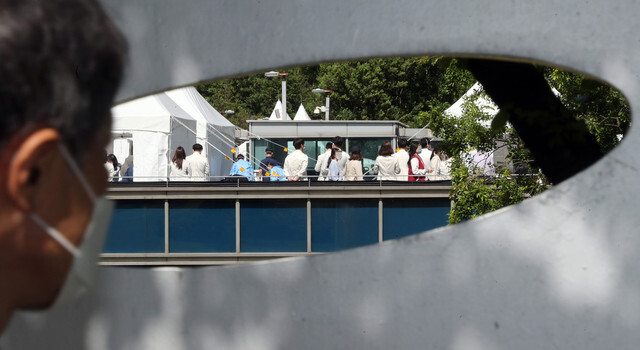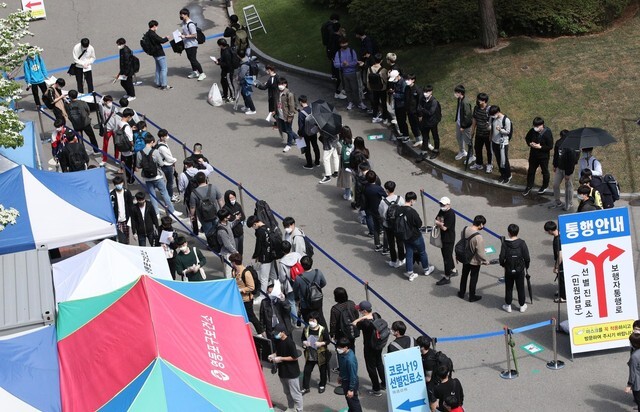hankyoreh
Links to other country sites 다른 나라 사이트 링크
COVID-19 cases of unknown transmission diagnosed at major hospital in Seoul

Novel coronavirus cases of unknown transmission route were diagnosed on May 19 in healthcare workers at Samsung Medical Center, one of South Korea’s five major large-scale general hospitals. With over 10 patients diagnosed in Seoul as of noon that day -- one day before third-year high school students were to report to schools for classes – many are fearful that the virus could spread more widely.
According to the Korea Centers for Disease Control and Prevention (KCDC), the city of Seoul, and Gangnam District, a total of 12 new COVID-19 cases were diagnosed between 12 am and 12 pm on May 19. At Samsung Medical Center in Gangnam District -- considered one of South Korea’s leading hospitals -- three additional nurses were diagnosed during the morning, joining a fourth who had been diagnosed the day before. All four were working in operation rooms in the thoracic surgery and ob/gyn departments. Two of them showed mild to no symptoms at the time of diagnosis. A total of 623 people have been identified to date as having been in contact with the nurses, with 347 of them testing negative for the virus. It has yet to be determined whether the infections began with a medical worker and spread within the hospital or whether they were spread from outside through an outpatient or visitor.
Samsung Medical Center said it had closed 25 operating rooms for the thoracic surgery, ob/gyn, and other departments on the third floor, where the nurses in question mainly worked, and would not be accepting new patients for a period of three days.
Another infection involving a hospital employee occurred in Yongin, Gyeonggi Province. A 26-year-old employee of Kangnam General Hospital received a positive diagnosis that day after being tested on May 18 with symptoms of fever, body aches, and coughing. The cumulative total of healthcare workers infected with the coronavirus stood at 266 as of May 19; to date, no cases of patients being infected by medical staff have been found.
Also diagnosed that day was a 19-year-old student at the Korean Science & Technology Occupational Training College (KSTC) in Seoul’s Yeongdeungpo District. The student in question was determined to have visited a karaoke room in Seoul’s Dobong District at around 10 pm on May 7, around the same time that three individuals who later tested positive in connection with an Itaewon club-related cluster were leaving. He was also a participant in the “credit bank” system operated by the Ministry of Education; the 623 credit bank students at KSTC had all been attending on-campus classes at the school since Apr. 20. The student in question was determined to have continued attending classes through May 15 after first showing symptoms on May 11. Disease prevention authorities are currently conducting an epidemiological investigation on those who came into contact with him at the school.

Another eight infections were diagnosed in connection with an after-school academy instructor in Incheon who concealed his activities from authorities, bringing the total of associated cases to 25. One of them, the four-year-old grandchild of the driver of a taxi in which the instructor traveled, is believed to be a case of fourth-generation transmission. A married couple who traveled in the taxi, both Chinese nationals, also tested positive that day.
That afternoon, the South Korean government held the fourth meeting of its everyday disease prevention committee, where it added beaches, postnatal care centers, water parks, and five other categories to its list of 31 types of facilities for which coronavirus transmission risk is to be assessed, with the evaluation to be based on the six standards of density, ventilation, activity, crowding, duration, and management. On this basis, facilities classified as “high risk” included “hunting pubs” (a kind of singles bar), “old-fashioned pubs,” karaoke rooms, and athletic facilities offering indoor cycling and other indoor group exercise. Those classified as “moderate risk” include after-school academies, internet cafés, indoor water parks, wedding halls, bars, and bathhouses.
By Choi Ha-yan, Ock Kee-won, Seon Dam-eun, and Kwon Ji-dam, staff reporters
Please direct comments or questions to [english@hani.co.kr]

Editorial・opinion
![[Guest essay] Maybe Korea’s rapid population decline is an opportunity, not a crisis [Guest essay] Maybe Korea’s rapid population decline is an opportunity, not a crisis](https://flexible.img.hani.co.kr/flexible/normal/500/300/imgdb/original/2024/0430/9417144634983596.jpg) [Guest essay] Maybe Korea’s rapid population decline is an opportunity, not a crisis
[Guest essay] Maybe Korea’s rapid population decline is an opportunity, not a crisis![[Column] Can Yoon steer diplomacy with Russia, China back on track? [Column] Can Yoon steer diplomacy with Russia, China back on track?](https://flexible.img.hani.co.kr/flexible/normal/500/300/imgdb/original/2024/0430/1617144616798244.jpg) [Column] Can Yoon steer diplomacy with Russia, China back on track?
[Column] Can Yoon steer diplomacy with Russia, China back on track?- [Column] Season 2 of special prosecutor probe may be coming to Korea soon
- [Column] Park Geun-hye déjà vu in Yoon Suk-yeol
- [Editorial] New weight of N. Korea’s nuclear threats makes dialogue all the more urgent
- [Guest essay] The real reason Korea’s new right wants to dub Rhee a founding father
- [Column] ‘Choson’: Is it time we start referring to N. Korea in its own terms?
- [Editorial] Japan’s rewriting of history with Korea has gone too far
- [Column] The president’s questionable capacity for dialogue
- [Column] Are chaebol firms just pizza pies for families to divvy up as they please?
Most viewed articles
- 1First meeting between Yoon, Lee in 2 years ends without compromise or agreement
- 2Under conservative chief, Korea’s TRC brands teenage wartime massacre victims as traitors
- 3Months and months of overdue wages are pushing migrant workers in Korea into debt
- 4[Guest essay] Maybe Korea’s rapid population decline is an opportunity, not a crisis
- 5[Column] Can Yoon steer diplomacy with Russia, China back on track?
- 6‘We must say no’: Seoul defense chief on Korean, USFK involvement in hypothetical Taiwan crisis
- 7Dermatology, plastic surgery drove record medical tourism to Korea in 2023
- 8After election rout, Yoon’s left with 3 choices for dealing with the opposition
- 9Two factors that’ll decide if Korea’s economy keeps on its upward trend
- 10[Column] Behind factional animus of Korean politics, victim mentality festers